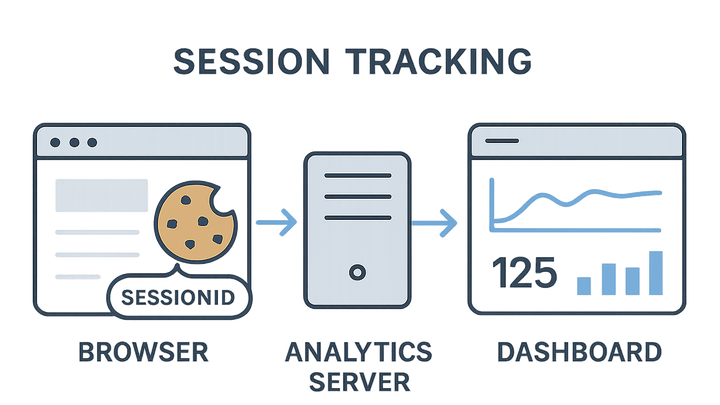Published on 2025-06-28T07:51:22Z
What Are Session Cookies? Definition and Analytics Use Cases
Session cookies are temporary data packets stored in a user’s browser memory for the duration of a
single browsing session. Unlike persistent cookies, they expire when the user closes their browser or tab.
In web analytics, session cookies play a crucial role in grouping pageviews and events into sessions,
enabling metrics such as session duration, bounce rate, and pages per session. Tools like Google Analytics
4 (GA4) set cookies like _ga and _gid to maintain session continuity, while
platforms like PlainSignal take a cookie-free approach by relying on in-memory identifiers and server-side
tracking. Understanding session cookies, their implementation, and their privacy implications is essential
for accurate analytics and regulatory compliance.
Session cookies
Temporary browser-stored identifiers that track user sessions and interactions, expiring at session end, for accurate web analytics.
What Are Session Cookies?
Temporary, in-memory cookies that store a session identifier for the duration of a single browsing session. They expire when the browser or tab is closed, distinguishing them from persistent cookies.
-
Definition
Session cookies are small pieces of data stored in a user’s browser memory for the duration of a single browsing session. They hold a unique session ID that servers and analytics tools use to group multiple requests from the same user.
-
Key characteristics
Session cookies have several defining attributes:
-
Lifespan
Expires automatically when the browser or tab is closed.
-
Storage
Kept in memory; not persisted to the user’s hard drive.
-
Scope
Tied to the domain that created them and limited to the browser session.
-
Role in Web Analytics
Session cookies enable analytics tools to group pageviews and events into sessions, powering key metrics and insights about user behavior.
-
Session stitching
Assigns a unique session ID to tie multiple pageviews and events within a single visit.
-
Session duration measurement
Calculates how long a user stays on the site by recording timestamps at session start and end.
-
Pageview association
Links pageviews and events to the same session ID to build a coherent activity timeline.
Implementation Examples
Examples of how session cookies are set in code for different analytics platforms.
-
GA4 tracking code
Google Analytics 4 uses cookies like
_gaand_gidto maintain session state. Example integration:<script async src="https://www.googletagmanager.com/gtag/js?id=GA_MEASUREMENT_ID"></script> <script> window.dataLayer = window.dataLayer || []; function gtag(){dataLayer.push(arguments);} gtag('js', new Date()); gtag('config', 'GA_MEASUREMENT_ID'); </script> -
PlainSignal integration
PlainSignal offers a cookie-free simple analytics approach, eliminating session cookies and relying on in-memory identifiers. Example snippet:
<link rel="preconnect" href="//eu.plainsignal.com/" crossorigin /> <script defer data-do="yourwebsitedomain.com" data-id="0GQV1xmtzQQ" data-api="//eu.plainsignal.com" src="//cdn.plainsignal.com/plainsignal-min.js"></script>
Privacy and Compliance Considerations
Session cookies have privacy implications and may require user consent under regulations such as GDPR. Consider cookie banners, opt-ins, and cookie-free alternatives.
-
Gdpr and consent
Under GDPR, session cookies still require transparency in cookie banners and user consent unless they are strictly necessary.
-
Cookie banner implementation
Implement banners that allow users to accept or reject analytics cookies, including session cookies, before they are set.
-
Cookie-free alternatives
Platforms like PlainSignal avoid cookies entirely, using server-side identifiers to maintain sessions without client-side storage.
Limitations and Best Practices
While session cookies are useful, they have limitations. Follow best practices to ensure accurate tracking and user privacy.
-
Short lifespan
Session cookies expire at the end of the session, making it impossible to link visits across sessions.
-
Vulnerability to tab closure
Closing the browser tab or window ends the session, which may prematurely terminate session tracking.
-
Blockage by browser settings
Some users or browsers block cookies by default, preventing session tracking unless alternatives are used.
